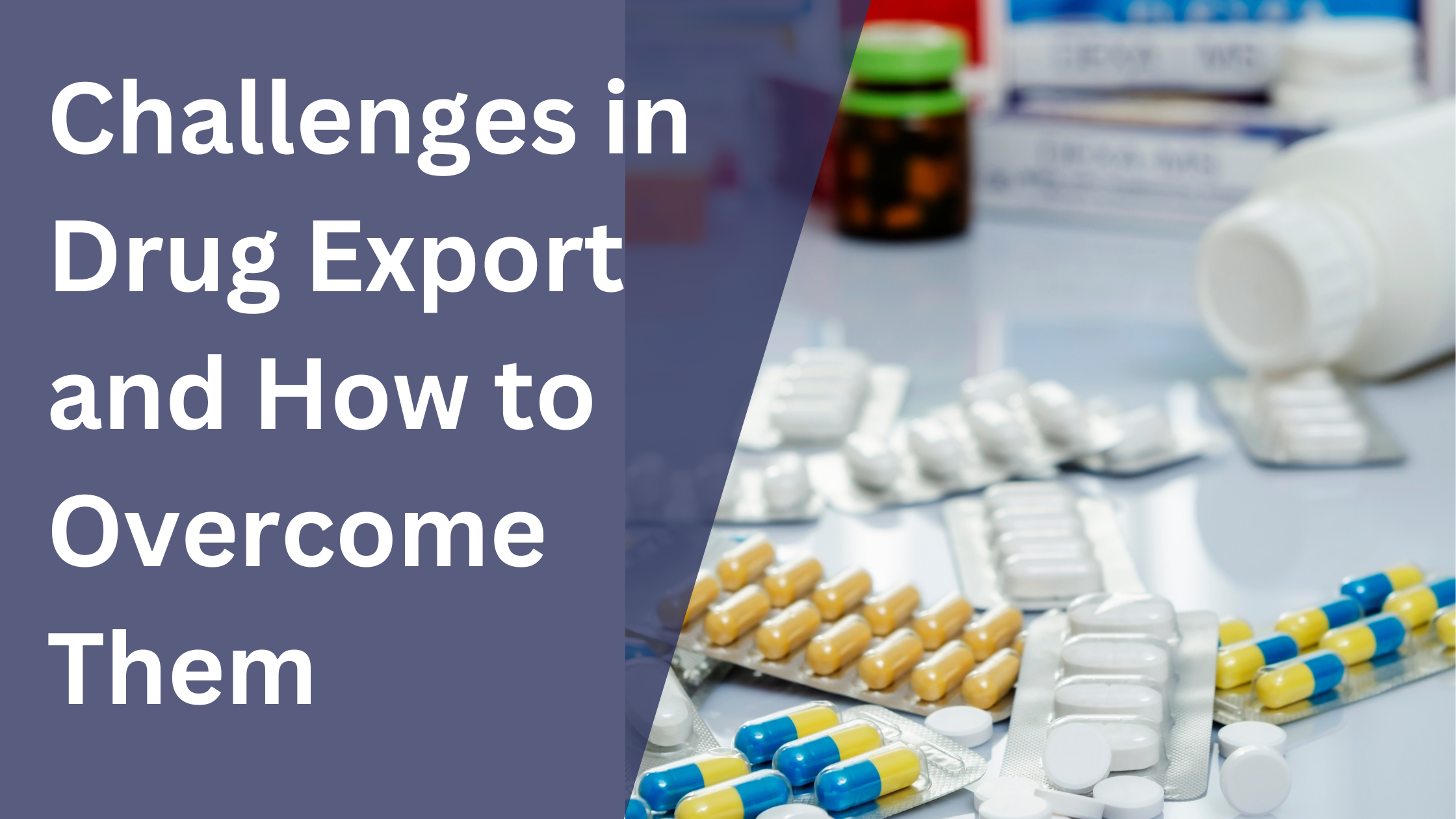The global pharmaceutical market offers vast opportunities for businesses looking to export drugs. However, exporting drugs comes with a set of challenges that can make the process complex and demanding. From meeting international regulatory requirements to handling logistical hurdles, exporters need to be well-prepared to navigate these obstacles. This blog explores the common challenges in drug export and provides practical solutions to overcome them.
Understanding the Importance of Drug Export
Drug export is a significant contributor to the global healthcare system and the economy. Countries rely on imported medicines to address healthcare needs that their local industries cannot meet. For exporters, it opens doors to new markets, increases revenue, and strengthens their global presence. However, tapping into international markets requires thorough planning and compliance with strict standards.
Key Challenges in Drug Export
- Complex Regulatory Requirements
- Every country has its own regulations for importing drugs. These include quality standards, labeling rules, and certifications. For example, in the European Union, drugs must comply with European Medicines Agency (EMA) guidelines, while in the U.S., the Food and Drug Administration (FDA) has strict rules. In India, obtaining the CDSCO Drugs Import License is a critical requirement for exporting drugs. The CDSCO Test License may also be necessary for specific drug types that need to undergo testing for quality assurance before being exported.
How to Overcome It:
- Stay updated on the importing country’s regulatory framework.
- Work with legal experts or consultants who specialize in pharmaceutical regulations.
- Obtain necessary certifications, such as Good Manufacturing Practices (GMP), CDSCO Test License, and the CDSCO Drugs Import License for India.
- Documentation and Licensing
Exporting drugs requires extensive documentation, including licenses, certificates of analysis, and shipping documents. Missing or incorrect paperwork can delay shipments or lead to penalties. In addition to the drug export license, obtaining an ADC NOC certificate is crucial for some markets, especially for drugs with specific ingredients that require approval from regulatory bodies.
How to Overcome It:
- Create a checklist of all required documents before starting the export process.
- Use software tools or hire experts to manage documentation efficiently.
- Regularly review and update licenses to avoid expiration. Ensure that the drug export license and ADC NOC certificate are obtained in time.
- Quality Control and Assurance
Maintaining drug quality during production and transportation is critical. A single lapse can lead to product rejection or legal actions.
How to Overcome It:
- Adhere to stringent quality control measures during manufacturing.
- Use temperature-controlled logistics for sensitive drugs.
- Conduct regular audits of your manufacturing and storage processes.
- Tariff and Customs Barriers
Importing countries often impose tariffs, duties, or other fees on pharmaceutical products. Customs procedures can also vary widely, causing delays and increasing costs.
How to Overcome It:
- Research tariff structures and customs policies in target markets.
- Work with experienced customs brokers to streamline the clearance process.
- Explore free trade agreements (FTAs) that may reduce tariffs.
- Logistical Challenges
Ensuring timely delivery of drugs while maintaining their quality is a significant logistical challenge. Transportation delays, improper storage, or mishandling can compromise the shipment.
How to Overcome It:
- Partner with reliable logistics providers experienced in pharmaceutical exports.
- Invest in packaging solutions that maintain product integrity.
- Use real-time tracking systems to monitor shipments.
- Competition in the Global Market
The pharmaceutical export market is highly competitive, with multiple players targeting the same regions. Competing on price and quality can be tough.
How to Overcome It:
- Focus on niche markets or specialized drugs with less competition.
- Offer competitive pricing without compromising quality.
- Build strong relationships with distributors and healthcare providers in target markets.
- Cultural and Language Barriers
Understanding the cultural and business practices of the importing country is crucial. Miscommunication or lack of cultural awareness can hinder business deals.
How to Overcome It:
- Learn about the cultural and business etiquette of the target market.
- Hire local representatives or translators to facilitate communication.
- Provide product information in the local language.
- Currency Fluctuations and Payment Risks
Exchange rate fluctuations and delayed payments from foreign buyers can impact profitability.
How to Overcome It:
- Use forward contracts or currency hedging to manage exchange rate risks.
- Work with banks or financial institutions to secure payment guarantees.
- Opt for letters of credit or advance payments to reduce payment risks.
Tips for Successful Drug Export
- Market Research
Understand the demand for your products in the target market. Analyze competitors, pricing, and consumer preferences to craft a strong entry strategy.
- Build a Strong Compliance Team
Having a dedicated team to handle regulatory compliance ensures you meet international standards consistently.
- Invest in Technology
Use technology to streamline operations, from manufacturing to shipment tracking. Automation can reduce errors and improve efficiency.
- Focus on Branding and Marketing
Build a reputable brand by highlighting your commitment to quality and compliance. Use marketing campaigns to establish your presence in the target market.
- Leverage Government Support
Many governments offer incentives and assistance programs for exporters. For instance, in India, the Pharmaceutical Export Promotion Council (Pharmexcil) provides valuable resources and support for drug exporters.
Conclusion
Drug export is a lucrative opportunity but comes with its share of challenges. By understanding the hurdles and implementing the right strategies, pharmaceutical businesses can successfully expand into international markets. Staying compliant, investing in quality, and building strong partnerships are the cornerstones of a thriving export business.
Exporting drugs not only boosts a company’s growth but also plays a vital role in improving global healthcare. By overcoming challenges, exporters can make a positive impact while reaping the rewards of international trade. Ensure that all required licenses, such as the CDSCO Test License, CDSCO Drugs Import License, drug export license, and ADC NOC certificate, are in place to ensure smooth and successful drug exports.



